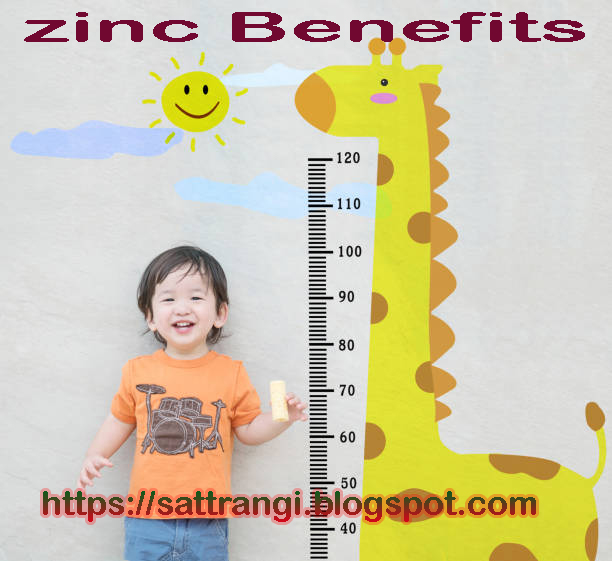"Zinc for child growth" Zinc is an essential mineral and one of the most important nutrients for a fast-growing body. It participates in the healthy growth and development of children because it is necessary for the construction of new Tissues. Zinc is also necessary for the activity of more than 100 different enzymes in the body and plays a role in:
After Iron, Zinc is the Second Most rich Trace Minerals in human Body and Found in Every Cell.
What is zinc used for:
Zinc is knowing an essential "Nutrient", "Mineral".
Human Body Can't Create, stock or reserve it. So, You have to Take it
through diet and other ways like Supplements for fulfill "Zinc deficiency symptoms".
What are the benefits of taking zinc?
"Zinc uses in body"
Zinc is found in cells throughout the body. Helps the immune system fight
invading bacteria and viruses. The body also needs zinc to make protein
and DNA, which is the genetic material in all cells. During pregnancy,
infancy and childhood, the body needs zinc to grow and develop normally.
Zinc also helps wound healing and is important for correct taste and
smell.
Health Benefits of Zinc on Kids Health:
Zinc and its role in immunity and inflammation:
Zinc helps maintain healthy immune function in children and can reduce the
frequency of mild upper respiratory tract infections. When zinc intake is
insufficient, it will lead to poor immune function and increase
susceptibility to diseases.
Zinc for bones Health in Kids:
Zinc is an essential mineral required for normal bone growth and bone
homeostasis. In addition, zinc seems to promote bone regeneration.
Zinc Helps in Metabolize Other Nutrients:
Zinc is required for the metabolism of carbohydrates, fats and
protein and is therefore important for getting the most out of the food
children eat.
Zinc Helps to Maintain Healthy appetite in Children:
When zinc is insufficient for a period of time, it will cause a decrease
in appetite, which is not ideal for children who are growing fast and are
often picky eaters.
Zinc in Wound Healing:
Zinc is essential for wound healing. Therefore, it is especially valuable
for children who are prone to minor abrasions and bruises.
Zinc for height growth:
In conclusion, zinc supplementation improved the linear growth (height)
of healthy school-age children, and no significant adverse events were
found. Zinc supplementation should be regarded as a routine strategy to
improve and reduce growth retardation in school-age children in areas
where zinc deficiency is endemic.
"When children do not get the required proportion of zinc, it will cause memory loss, learning problems, and reduce the mind's ability to concentrate."
Zinc-rich foods for kids:
Zinc for children is available from the following food items:
- Red Meat
- Sea Food
- Potatoes along with their skin
- Yogurt
- Beans:
- Nuts: Nuts like almonds are an excellent source of zinc. Use roasted nuts like cashews, peanuts, walnuts as snacks for your hungry teenage children.
- Whole grain cereals
Are excessive amounts of zinc bad for your child?
An excessive amount of zinc from supplements could cause diarrhea,
vomiting, abdominal cramps and headaches. Long-term use of zinc supplements
could lead to toxicity.
Zinc Supplementation Is Necessary:
Your child may need very little zinc, but zinc deficiency can cause many
developmental problems.
If you find that your child is deficient in zinc, it is recommended to add
zinc to the child. Facts have proved that it is helpful to give zinc
supplements to children with such defects. There are many zinc supplements
on the market, and you should consult your doctor before starting to
supplement your child.













